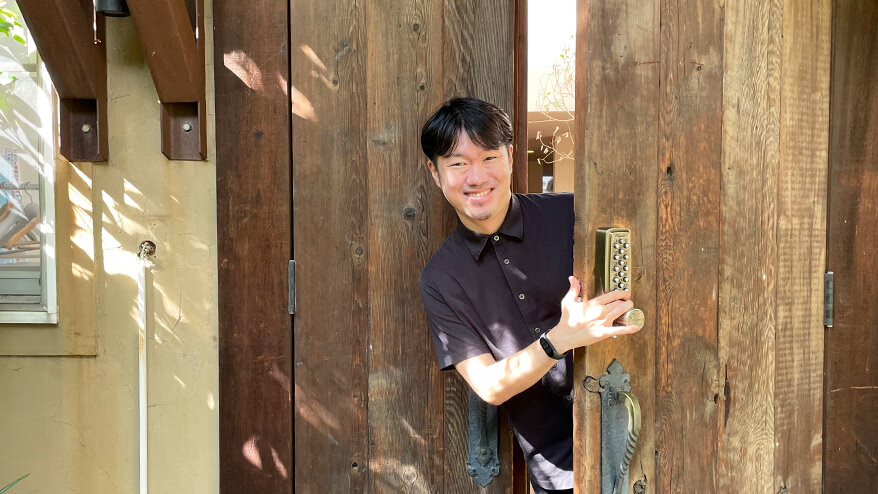Hello, I'm Sugimoto, a writer living in Kyoto.
This is an interview series called " Freedom and Responsibility: Everyone's Systems and Work Styles Laboratory ," in which we ask Monosus members who work fully flexibly and remotely about their work styles, their thoughts on the company, and their outlook on work. This time, we caught up with Hata Minetake of Monosus Thailand (hereinafter referred to as Monotai), who was temporarily back in Japan, at the Yoyogi office.
He has a soft personality and a casual way of speaking, but when it comes to work, he is sharp. I was listening to him, thinking that he must be good at controlling the amount of force he exerts on things. The photo was taken by Reiko Takita, a designer who is a member of the Monosasu website secretariat.
The joy of being a director
Sugimoto: I heard that Hata Mine joined the company in 2017. An article from that time said that he had worked at a shoe store in Shibuya 109 before switching jobs to become a programmer.
Hata Mine: I've been in the IT industry longer than I have in the apparel industry. After working as a back-end programmer, I moved to the world of web production and started coding using markup languages such as HTML and CSS. One of the reasons I moved to Monosus was that it had a coding specialist service called "Coding Factory (CF)" and I had many fellow coders. I'm now a coding specialist director.
Sugimoto: What kind of job is a coding director?
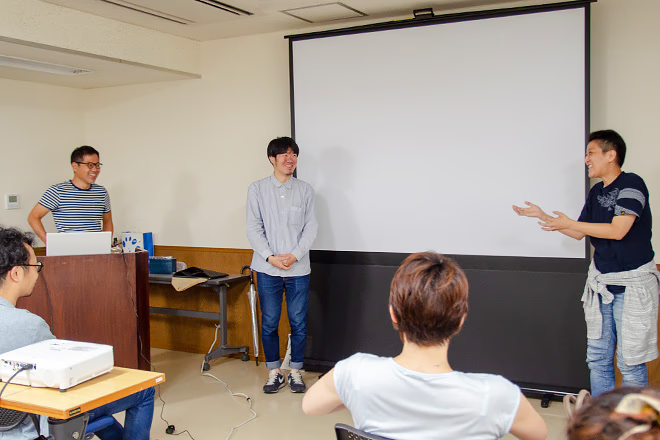
Hata Mine when he won his first MVP award in 2018, the year after he joined the company.
Hata Mine: I was originally an engineer, so I thought that if I became a director, I would have to be prepared to give up the path of seeking highly difficult work as an engineer. But when I decided to do it, I found that the work of a director was actually more interesting. For one project, I put together a work process, and when I think about the order of tasks and create a flow, it feels great when it goes well. What's more, it's also fun to streamline the work flow and increase productivity. It's good for both the company and myself.
Sugimoto: When did you become a coding director?
Hata Mine: When I interviewed for Monosus, I said, "I'd like to work as a coder for about a year and then become a director," and when I joined the company, I was told, "Okay, you'll be a director" (laughs). The first project was quite difficult, but I felt that I could grow because they trusted me. I thought, "I'll do it well next time."
Remote work has changed the quality of life
Sugimoto: Monosus introduced a full flextime system the year you joined the company. Did anything change your work style at that time?
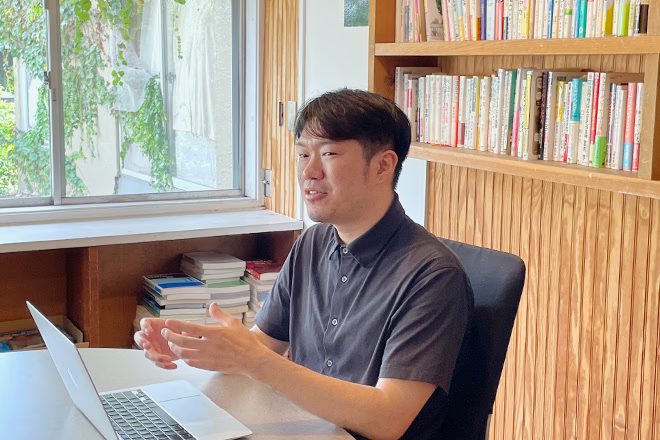
Hata Mine: I haven't changed it. I was still in training and not used to the job, so I thought I shouldn't cause trouble for customers, and I'm also a bit of a lazy person. After listening to the feedback from people who had tried out the new system, I thought I might try to imitate it. After listening to everyone's stories, I decided that I didn't need to change it after all.
Since we went fully remote in 2020, I feel like we've finally seen the benefits of full flextime. Even with full flextime, as long as you're tied to a place of work, your work hours are fixed, so you don't have much freedom when it comes to working hours.
Sugimoto: What do you mean?
Hata Mine: For example, I am currently in the position of requesting work from Thai members. I am responsible for them proceeding with the work as instructed and completing it within the man-hours budget. In order for them to work smoothly, it is better for me to start work earlier in the morning. I get up early to prepare materials and instructions, and give instructions around the time the Thai members start work. That way, I can take a longer lunch break and take a short nap. In the afternoon, I prepare for the next day's work or work on long-term projects. I can also go to the doctor for a quick visit during work that doesn't require the use of a computer.
If I hadn't been working remotely, I wouldn't have been able to work with true full flexibility. I would still be going to the office in the morning, finishing work in the evening, and going home.
Still, it's better to have offices and drinking parties
Sugimoto: I think that remote work has made it easier to balance work and life. In that case, have you ever wondered, "What is the point of having an office?"
Hata Mine: In my case, I was part of a generation that was able to handle their own work, and I think we were a generation that felt liberated by the shift to remote work. I'm sure there were people in older generations who were confused and asked, "What is remote work?", and I think people who joined the company as new graduates during the COVID-19 pandemic had a hard time suddenly working remotely.
Recently, Mr. Miyagawa (Monotai executive) and I have been working hard on recruiting at Monotai, and I wonder if it is possible to build trust with new employees and teach them how to do their jobs remotely. After all, having an office makes it easier to get to know each other. In the long run, I think an office is necessary to grow the organization while adding new members.
Sugimoto: Speaking of communication between members, CF involves a lot of collaborative work and also goes out drinking together quite often, so I get the impression that the members have strong relationships.
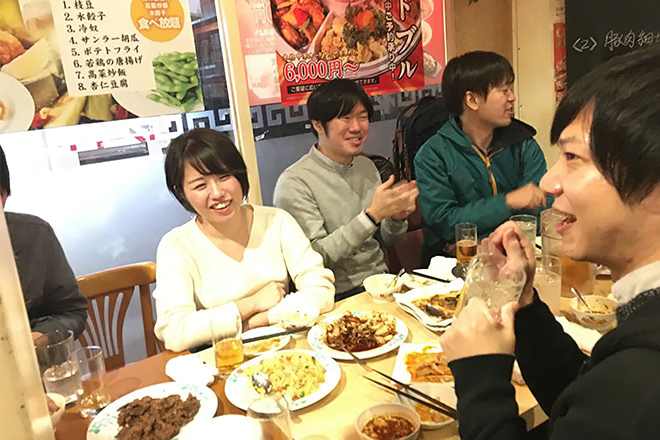
"CF Drinking" in 2018. Hata Mine looks like he's having fun! (Second from the right)
Hata Mine: That's right. I used to invite my bosses out quite a lot too. I would invite the members over and invite my bosses to drink with me (laughs). Even in Thailand, I still invite my bosses out to drink, so there hasn't been much change in terms of drinking. However, I can't meet the members from Japan, and we have fewer opportunities to work together, so I feel like communication is decreasing.
My colleague who I worked with in Japan, Kakunami-san, who I drank with almost every day, went to Kamiyama, so we've been pretty apart. Even if we were in charge of different projects, we would end up talking about work when we were drinking, and I think we were able to pick up new information from each other. It would be bad if I could only work with Thai members on my projects, so I would like to invite Kakunami-san as a guest on a regular basis. It might be a good idea to solve this problem by having a remote drinking party after the project is over.
It has become possible to "work anywhere" while remaining a company employee
Sugimoto: By the way, why did you go to Thailand, Hata Mine?
Hata Mine: The first time I went to Thailand was on a company trip in 2018. My boss at the time asked me to work there for about a week, so I stayed after everyone else had gone home. I thought, "This is a good way to work." I don't like the cold, but Thailand is warm. The roads aren't as clean as in Japan, and the electric wires are so tightly packed together that you might get electrocuted. But that actually made me excited, and I thought I'd like to feel the energy of the company as it develops. Before the COVID-19 pandemic, the first year was really fun.
Sugimoto: What was fun about it?
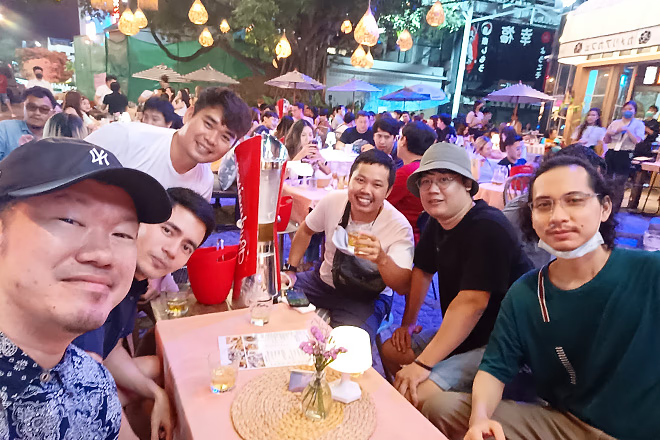
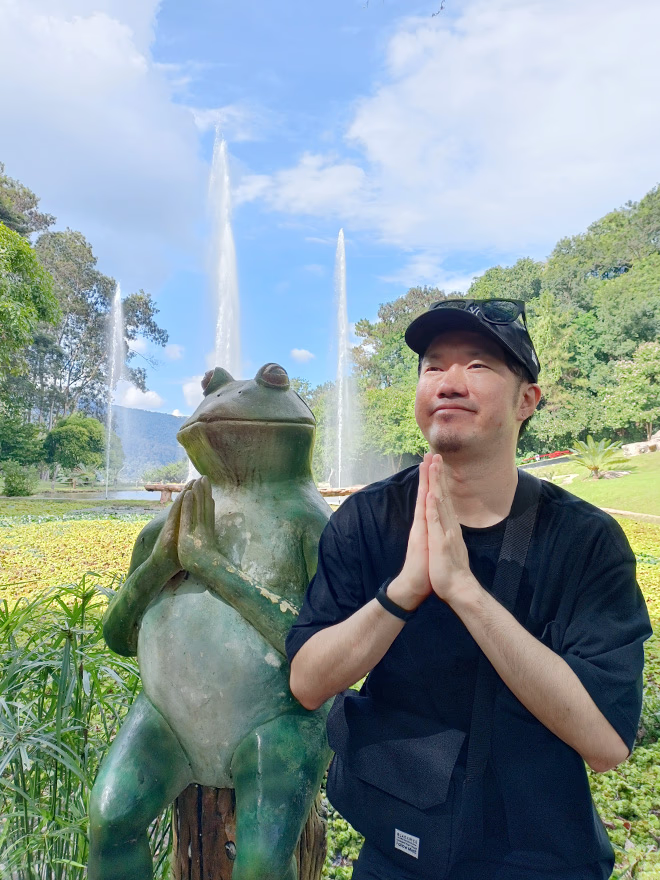
We went to Chiang Mai on a MonoThai company trip. As expected, Hata Mine-san looks like he's having fun!
Hata Mine: At that time, just walking around was fun. I couldn't speak either English or Thai, so I went to Thai classes and tried to learn English, and when I went shopping, I tried using the words I'd just learned and thought, "I'm successful!" It was interesting to see the number of phrases I could use increase, and I thought it was worth studying. I also tried talking to Thai people in the city.
Sugimoto: Did you ever feel stressed at work?
Hata Mine: One of the reasons I entered the web industry in the first place was because I thought it would be fun to be able to work anywhere. I thought it would be fun to become a freelancer someday and work remotely while enjoying the countryside life. However, I am still a company employee, living in Thailand where I want to be, and working whenever I want. In fact, I feel like I have upgraded what I want to do, so it feels like a dream come true.
Sugimoto: You are able to work freely while still shouldering the responsibilities of a director.
Hata Mine: If there is only freedom and no clear responsibilities, you may become anxious and wonder, "Is this okay?" In my case, I have a responsibility to make sure that the Thai members work smoothly within the budget. As long as I keep that in mind, I feel like I can do what I want. In the future, I want Monotai to grow and earn more, and for the Thai members to be happy. I think we should give them a salary and work style that makes them proud to work for a Japanese company.
My first impression of Hata Mine was that he was "not the kind of Monosus-like person I know, but a Monosus-like person." I thought that having Hata Mine among the Monosus members I already know would surely create a great feeling. And, although I also heard some slightly mischievous stories that I can't write in the article, my second impression was that "he seems like someone I could really rely on to work with" (it's strange, isn't it?).
Next time, when Hata Mine-san returns to Japan, I think it would be a good idea to invite everyone out for a drink. I'm sure he would be happy.
